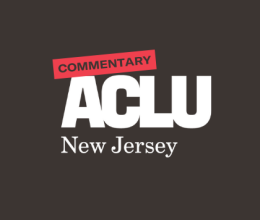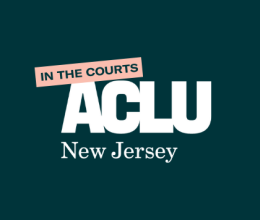
Introducing a New ACLU-NJ Quarterly Blog Series: Pursuing Justice
Even after nearly five years as executive director, I feel energized and humbled every time I tell a story about the impact of the work of the ACLU-NJ. Whether it’s describing courageous individuals challenging injustice or laying out the intricacies of a multi-year legislative campaign, few things underscore the far-reaching effects of this work as powerfully as telling the story of how it happened. That’s the premise behind our new quarterly blog series, Pursuing Justice. This post, as the first installment, covers an important aspect of our legal work: ACLU-NJ friend of the court briefs submitted in existing cases, where our contributions — often in partnership with stakeholders, like the Office of the Public Defender — provide a framework for supporting legal outcomes that advance civil rights, racial equity, and access to the courts.
The Real-Life Impact of ACLU-NJ's Strategic Litigation
The ACLU of New Jersey has a long history of submitting arguments in existing cases to highlight the civil rights and civil liberties issues at stake and make arguments grounded in principles that respect individual rights and equity. It’s known as an amicus brief, from amicus curiae, Latin for “friend of the court.” We participate as amicus in dozens of cases each year in federal and state court, including in nearly one-third of the cases heard in 2021 at the New Jersey Supreme Court.
The ACLU-NJ’s impact as a friend of the court, through legal briefs and oral advocacy, has helped to shape the legal landscape in our state and beyond. Amicus briefs are efficient by design, allowing us to pinpoint elements that are most important and relevant to expanding civil rights. Direct cases — which are also a significant part of our practice — often take years and can require hundreds or even thousands of hours of staff time to make their way through the courts. In complement to the depth of direct cases, amicus work gives us breadth.
This work has always been a bedrock of the ACLU-NJ, and effective because the New Jersey Supreme Court in particular has been a leader in using the state Constitution as an independent source for protecting individual rights. Right now, this work has never been more important. With the U.S. Supreme Court issuing decisions eviscerating long-established fundamental rights, we see just how crucial it is to have the bulwark of strong individual rights in the states.
Significant growth in the ACLU-NJ legal team in the last 12 years has allowed us to increase the ACLU-NJ’s footprint in the courts. Our frequent collaboration with allies and partners — such as the Office of the Public Defender, New Jersey NAACP, and dozens of civil rights and organizations — illuminates the real consequences for New Jerseyans, and the media coverage this work often generates conveys the human stories behind struggles for justice.
Three recent landmark cases in which the ACLU-NJ argued as amicus at the New Jersey Supreme Court might more vividly illustrate the influence of this work compared to a 30,000-foot view.
- Unconstitutional Car Search Over a License Plate Frame That Touched the Words “Garden State”
When we drive, most of us see more plastic license plate frames than we can count. But officers pulled over Miguel Roman-Rosado because his Honda-branded frame touched the bottom 10-15 percent of the words “Garden State” — a contortion of a law that prohibited any obstruction on license plates. The ACLU-NJ argued that this violated the Constitution, and the New Jersey Supreme Court agreed. Because of this ruling, we know that there will be fewer stops made on this basis, and thus fewer touches between New Jerseyans and police that too often lead to unjustified searches or worse. - Racial Bias Driving the State to Perform a Criminal Background Check on a Prospective Black Juror
Edwin Andujar did not have a fair trial because implicit bias infected the selection of his jury, the ACLU-NJ argued in State v. Andujar. The New Jersey Supreme Court agreed unanimously.
The prosecution performed a background check only on a Black prospective juror and used it to exclude him from the jury pool. This case was one of the first to recognize that all racial bias, including implicit bias, is unconstitutional, and this was one of the central arguments of the ACLU-NJ. The case also prompted the New Jersey Supreme Court to convene a judicial conference on jury selection, and to release 25 proposals concerning jury selection procedures to address voir dire and peremptory challenges, institutional and implicit bias, as well as systemic barriers to jury service. - Clergy Share the Trauma of Unconstitutional Racial Profiling in Their Communities
When a case reaches the state’s highest court involving the right of a criminal defendant to be free from unreasonable searches and seizures, it almost always means that the person subjected to the search was charged or convicted of a crime as a result.
But when police engage in racial profiling, the vast majority of those subjected to it are never charged with any crime. The result is that people of color – especially young Black men – carry with them the deep trauma of racial profiling, a trauma that courts rarely see.
In our brief in State v. Myers & State v. Nyema, the ACLU-NJ represented 66 clergy members of New Jersey who described to the Court the lifelong damage that results from unconstitutional racial profiling. The amicus brief forced the judicial system to face a mass trauma that is often rendered invisible, and the New Jersey Supreme Court ruled that the stops that were based on vague descriptions of race and gender were not constitutional.
In other cases, judges and court opinions have reaffirmed many of the arguments highlighted in ACLU-NJ briefs. At oral arguments, our lawyers are often regularly asked follow-up questions by judges and justices.
The fact that the same type of litigation happens at state-level ACLU affiliates across the country gives this work even greater weight. Other states have looked to New Jersey’s amicus strategy as a model for their own legal advocacy. In telling the stories of the work of the ACLU, most people think of now-iconic cases that led to the right of interracial couples to marry or equal protections for married lesbian and gay couples under federal law, whose court victories shaped a nation. But, taken together, the steady stream of amicus briefs, in New Jersey and nationally, shape the law in ways that make those singular victories possible.
I’ll be sharing more about the ACLU of New Jersey’s work, the strategy behind it, and our core values. We plan to cover topics on our legislative and coalition work, our integrated advocacy approach, and how we work with ACLU affiliates around the country.
It's an honor to share these stories with you, and I’m excited to bring you more of them in the coming months.


